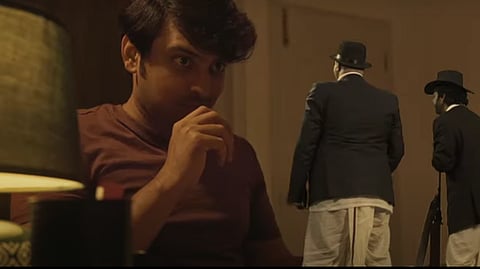Saramsha review: A tender rumination about life, dreams and all that’s in between
Saramsha (Kannada)(3 / 5)
In Surya Vasishta’s debut feature Saramsha, the emotional struggle of a writer curiously morphs into a ruminatory exercise, partly also functioning as a coming-of-age journey. As one of the concluding moments of the film spells out for us, the protagonist’s apparent dual life gives birth to an interesting tale of identities with a tinge of magic realism guiding the narrative. It is in this dialogue, between reality and imagination, that the said journey occurs.
Tejaswi Pandit or Tejas (Deepak Subramanya) has had a fondness for the written word since he was a child. Dreams, we learn, are a major part of this kid’s world; a kid who loves to wander off into his made-up whimsy, where his two beloved ceramic figurines – the Laurel and Hardy equivalents – spring to life. In fact, this duo could be his only friends because when kids of his age are busy soaking up the sun and playing on the streets, Tejas is more keen on fulfilling his sense of wonder. It helps his cause that both his teacher and then his father encourage him but when his mother dissuades him, he is forced to turn to academics.
And soon, the Robert Louis Stevenson books on his table have made way for ‘Fundamentals of Accounting’ as Tejas now recalibrates himself to tread his father’s path to become a chartered accountant. But can a boy, who grew up loving and living a more romanticised, implausible life, survive in a world of rationality and goals?
And right on cue, as though to rescue his protagonist from this misery, writer-director Surya Vasishta introduces his surrealistic gaze into the narrative. In a metaphysical manner, we see that the lines between fact and fiction, between the magical and the realistic have blurred and Tejas is now able to access a portal into an alternative ‘parallel’ universe. The story now starts to unfold in intriguing little chapters, such as ‘Down the Rabbit Hole’ or ‘Whispers of the Conscience’.
We gather that this new parallel universe is no fantastical place but one riddled with real-life dilemmas, occupied by the endearing married couple of Abhay (played by Surya himself) and Maya (Sruthi Hariharan). Abhay and Maya could be figments of Tejas’ subconscious, the characters in his story, or they could exist in reality, but only in a different realm of thought. What’s certain though is that Tejas cannot use this new-found territory to simply escape his dreary reality. He must confront himself and not remain a bystander in the story that is his own life.
Where Surya shines bright as a filmmaker is here, in this space navigating two parallel worlds. If Tejas’ issue is that he is too coy and cautious, Abhay and Maya are dealing with their own set of troubles, which are quite relatable. The portions involving this sudden switch between the two worlds are truly fascinating and the debutant filmmaker does a good job of taking the narrative forward smoothly. It’s kind of an existential quest that unravels with tinges of humour and romance and each of the cast members carries the essence of their respective characters superbly. The on-screen chemistry between Surya and Sruthi Hariharan is easily one of the highlights of the film, mainly because the two imbue their roles with tenderness and affection. The rest of the cast, Shweta Gupta, Aasif Kshatriya, Ravi Bhat, Ram Manjunath, Shruthi Pradeep, and others, too put on fine performances.
The problem, however, begins when the narrative runs out of exciting conceits to make its point and starts to meander. A lot of Saramsha unfolds in the form of dialogue between its characters and while one is expected to read between the lines, the denseness of the script doesn’t allow the viewer to fully embrace the approach. Instead of presenting or showing the heart of the matter through carefully constructed scenarios, the film literally tells us what it is about and takes away from us the joy of weaving our own little ‘version’ of the tale. One of the concluding moments of the film, in particular, feels a tad too heavy-handed because of its attempt to summarise things for us.
That said, Saramsha is one of those rare films that is truly empathetic and compassionate of its characters. It’s a film that cares deeply for the host of people it is discussing and is endearingly far removed from the usual beats of a commercial feature. The characters feel a lot closer to our everyday reality and the director’s feather-light take on their lives is refreshing, particularly in the times when cinema is a bit too on the nose and unabashedly aggressive. Of course, Saramsha would have benefitted a great deal from a tighter screenplay and a more polished visual aesthetic, but it’s a film that will have you walk out of the theatre with a gentle smile on your face.
Disclaimer: This review was not paid for or commissioned by anyone associated with the film. Neither TNM nor any of its reviewers have any sort of business relationship with the film’s producers or any other members of its cast and crew.

